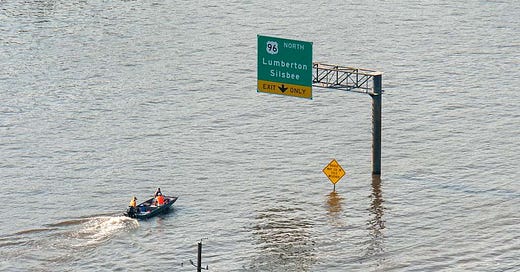We now live in a world of planned disasters.
What kind of future is being planned for the place you call home?
Hurricane Beryl blew into Houston this week, leaving “many bayous and roadways … flooded and more than 2.2 million homes and businesses” without power. Now, more than a million people are expected to still be without power until next week, leaving many to face swampy humidity and high temperatures without any way to cool their homes. And, as many observers note, this was only a category one hurricane.1
When these things happen, we still call them “natural disasters.” But that’s not right.
If we want to understand the landscape of brittleness that surrounds us, we must acknowledge that in a very real sense all these catastrophes are planned disasters.
The climate change driving worsening storms is itself a planned disaster — largely the product of a well-funded strategy of denialism and predatory delay.
The vulnerability of the communities these storms are battering is a planned disaster — set in motion by the zoning and development of sprawl in flood plains, long after we knew the dangers involved. (The same can be said for cities around the world and a variety of other landscapes of risk, from waterless deserts to steep slopes, endangered shorelines to wildfire zones.)
The fragility of the power grid is a planned disaster — a product of the willful refusal to pursue distributed clean energy and new technologies, to spend the money to upgrade the grid itself and create better interconnection, and to include readiness for more frequent extreme weather events in operational priorities.
The washing out of roads, the releases of sewage and toxics into flood waters, the inability of first responders and hospitals to keep up with heat casualties — all planned disaster.
Many heat deaths are themselves planned disasters — with contributions made by everything from lax building codes to neglected street trees, laws that allow landlords not to provide air conditioning (or even ban its installation) to overly wide road standards (and an insane oversupply of parking). Hot acres of asphalt and badly built homes are choices that kill people.
The harsher conditions we face today have been being predicted for years, indeed, for the entire careers of all but the oldest professionals. People whose job it was to craft built environments for the public good planned a world unready for what they had been warned was coming. Even if they never meant for disasters to happen, they planned them.
If you think these same institutions and interests aren't busily planning far worse disasters — far greater mismatches between the cities we'll have and the cities we'll need — you're not paying attention.
If you think these same institutions and interests aren't busily planning far worse disasters — far greater mismatches between the cities we'll have and the cities we'll need — you're not paying attention.
The more exposed your community, the more radical the planning of (and the more rapid the building of) improved systems and places must be.
The alternative is the erosion of local capacities and the financial collapse of the local economy.
In brittle places, the absence of transformational ruggedization efforts is a sure sign of future disasters being planned.
- Schedule a consultation with me to discuss personal ruggedization in your life or business, or to explore a business opportunity.
- Want me to give a keynote talk at your conference, or a bespoke presentation for your meeting? Email to inquire.
- Subscribers to this newsletter also get not only my heartfelt appreciation but first notice about events and online classes (with subscriber-only discounts).
- Check out my books: Worldchanging and Carbon Zero
- View my TED Global talks on sustainability and cities.
- I was featured in a 2022 NY Times Magazine piece, "This Isn't the California I Married," and my writing was the jumping-off point for an episode of This American Life: Unprepared for What Has Already Happened. I’ve recently talked about ruggedization and sustainability on these podcasts: Without; The Big Story; Everybody In the Pool.
- Visit my Bookshop shop to discover some of my top reads.
- Stay connected on social: Twitter, Facebook, Instagram, Bluesky
For excellent coverage of Beryl and its aftermath, follow Houston Public Media.




